Lobstering, a field traditionally dominated by men, is physically and emotionally demanding. For a growing number of women, that’s part of the draw.
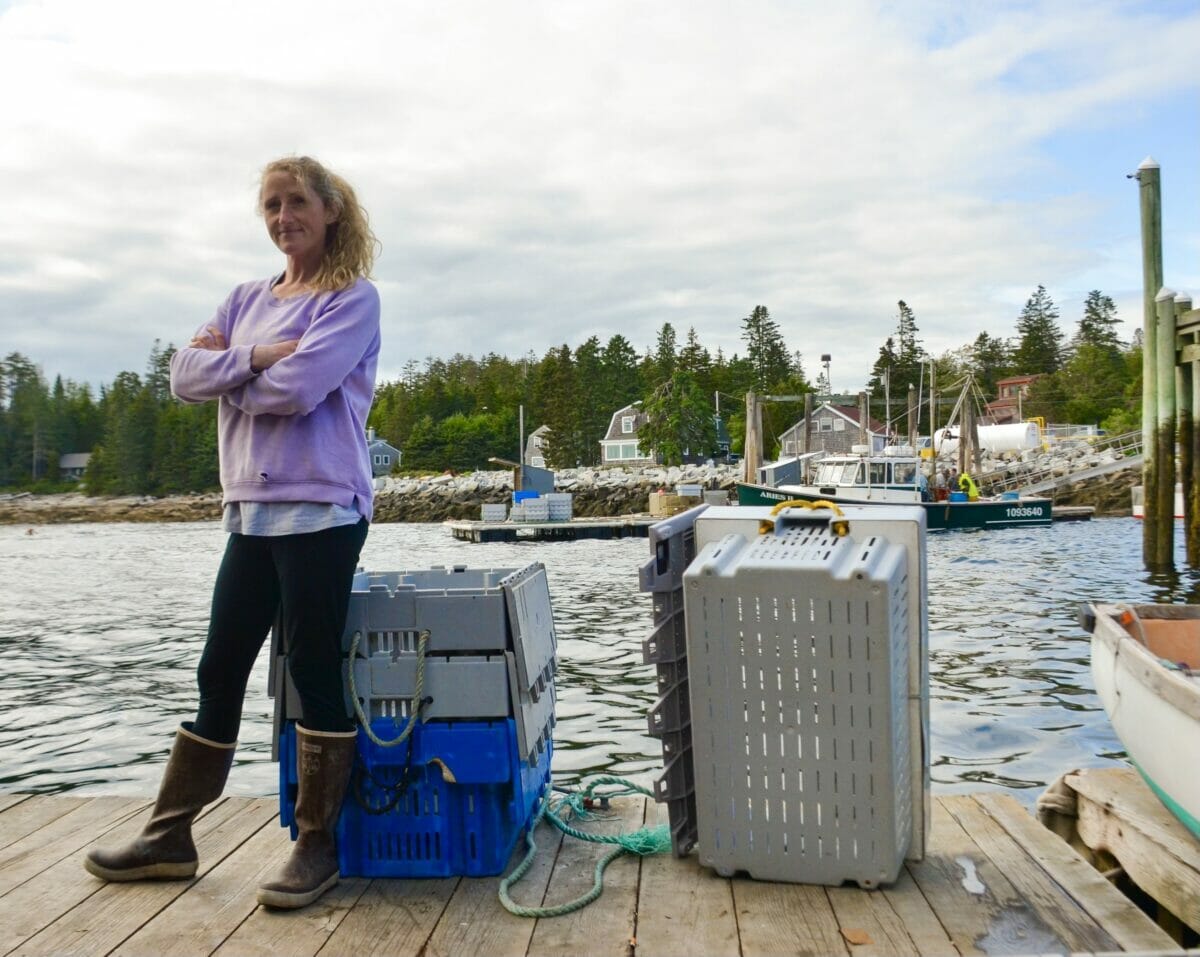
To become a lobster boat captain on the rugged coast of Maine, you will need more than just a few lobster traps and a boat. To catch lobster, your days will begin in the dusky pink glow of dawn, filling bait bags with dead fish and hauling and stacking lobster traps that weigh upwards of 50 pounds. On the boat, you must always have one eye on the trap lines that threaten to entangle you and pull you overboard. There is paperwork, too: You must complete an apprenticeship, and you will have to pass the US Coast Guard’s captain’s test.
If you are a woman, the challenges don’t stop there. You may be the only woman fishing out of your harbor, vying for respect in an industry that throughout its long history has welcomed only men onboard. Every day, you’ll be working to prove you belong on the boat and not keeping the books back at the wharf.
When Krista Tripp was 18, she’d completed all of the hours at sea necessary to get her captain’s license, but her parents submitted her brother’s paperwork to the State of Maine and not hers. Why? Even though Krista had been hauling traps since she was eight years old and running her own boat since 15, the expectation was that now she’d settle down and start having babies.
“My brother and I shared the boat, we had 150 traps and I became obsessed at an early age,” Tripp recalls. “I knew that was what I wanted to do. But, as a girl, my parents didn’t really take me seriously.”
Tripp would spend the next few years working as a sternman off of a scallop boat in Massachusetts. Eventually, she returned to Maine, and after 14 years, she got herself off the waiting list and became the captain of her own lobster boat. Today, she has been captaining her own lobster boat for more than eight years.
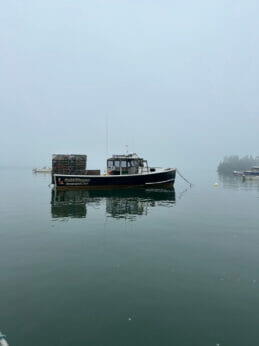
Heather Strout Thompson’s boat “Gold Digger” in Harrington Harbor. (Photo courtesy Heather Strout Thompson)
Heather Strout Thompson started lobstering at age 10. She fishes the state limit of 800 traps out of the rural harbor of Harrington, just outside of Jonesport in the deep Downeast of Maine. Growing up there, it was either the sea or the blueberry fields, and Strout wasn’t a fan of the blueberry fields.
“My dad was the one who gave me the hardest time out of anybody,” says Strout. “I always wanted to prove him wrong, throughout my childhood and even now, to prove that I can do it.”
Down the coast in the endearingly named town of Friendship, Kelly Wallace started fishing at age five. When she was old enough, she bought her own skiff and started hauling her traps by hand. Lobster traps are typically hauled onboard using a hydraulic trap hauler, but Wallace would haul 150 traps—each weighing 50 pounds—by hand all through high school.
Wallace’s family has been working on the water for six generations and operates the Wallace Lobster Wharf. But she was the first female member of her family to choose to become a lobster boat captain.
“It’s definitely hard to be a woman in the fishing industry because you aren’t ‘one of the guys’,” admits Tripp. “A lot of men are really egotistical when it comes to their jobs being physically demanding—so when they see a girl doing the same kind of job, it makes them feel less of a man. They just aren’t as welcoming.”
But none of these women has let a little bit of ego hold them back.
“I might not do things the exact way a man does things,” says Heather Strout Thompson. “But I can get the job done. I might not lift a trap with my arms—I might have to use my legs a little bit—but I can get it up there.”
Being a woman in the lobstering industry can be singular, but it is a challenge upon which all three women have thrived. And within the world of lobster fishing, the proof is in the traps hauled and the hours put in.
“I’ve noticed more men giving women opportunities,” says Thompson, “because they’re looking for a more reliable person to work with and women are very reliable. They’re going to do whatever they can to prove themselves.”
Tripp echoes the same sentiment. “Some guys think that women are great workers because they want to prove themselves more.”
“When I was younger, you never saw women on a boat, ever,” says Tripp. “I know a lot of other women lobstering now, but I never did before.”
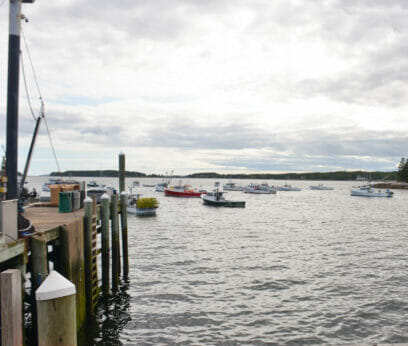
Commercial fishing is one of deadliest professions in the United States. (Photo: Kirsten Lie-Nielsen)
The lobster industry is a tough place to make a living for anyone. It is the backbone of Maine’s economy and the iconic food of the state, but it has become a more challenging industry in recent years.
The Gulf of Maine is warming faster than any other body of water in the world, and to survive, lobster may follow the Maine shrimp north to Canadian waters. When fishing, lobstermen are careful to take only crustaceans of a certain size and to return females with eggs to the sea. Nevertheless, additional environmental regulations come down hard on Maine lobstermen, while the cruise ships and tankers responsible for pollution and whale strikes are largely unregulated. Since 2020, the price of fuel has risen steadily, while the market price of lobster has dropped. Commercial fishing remains one of the most deadly professions in the United States, making every trip to haul a risk.
With all of these hurdles, you may wonder why women are heading out to sea in pursuit of the recognizable red “bugs.” But Maine women are as resilient as the state’s rocky coast, and they seem uniquely suited to thriving in a trade that requires grit and diligence.
Marina Landrith is a 13-year-old aspiring lobsterwoman who fishes out of the picturesque harbor of Rockport. She currently holds a student license that allows her to fish up to 50 traps. On lobstering days, she launches her boat, fills her bait bags and motors out to haul her traps.
Her family has been lobstering for five generations and she was inspired to begin by her uncle, who lives and fishes off of Matinicus Island, the farthest inhabited land off the east coast of the US. Matinicus is home to less than 100 year-round residents, the majority of whom are lobstermen. Landrith’s uncle has been taking her out lobstering since she was a baby.
“What I enjoy most about it is that I get to spend time with my dad when we go out to haul and the feeling of accomplishment when I get in from hauling and sell what I caught,” says Landrith.
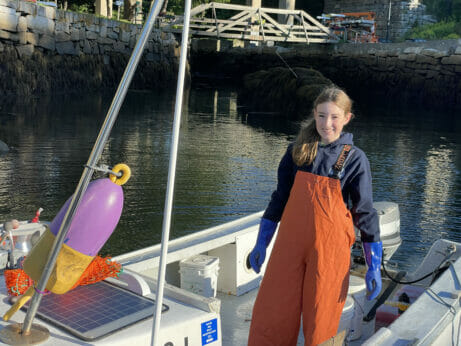
Marina Landrith holds a student license that allows her to fish up to 50 traps. (Photo courtesy Dale Landrith)
She knows several women who lobster or assist as sternmen on lobster boats, including her own 10-year-old cousin. A sense of accomplishment and personal pride seem to drive every woman in the industry.
“Nobody else cares that I’m doing this or not,” says Heather Strout Thompson. “It’s something within yourself that you have to push and want to be able to do. At the end of the day, you’re the one that’s going to sit back and ask, ‘Did I work as hard as I could? Did I earn my spot here?’ And I feel I have.”
While commitment and drive push these women off shore every day to compete in the lobstering industry, the inspiration always circles back to family. The majority of lobstermen, male or female, are continuing a family tradition.
When Landrith thinks about her future, she can imagine life as a lobsterwoman. Someday, she wants to live on Matinicus like her uncle. “I think it would be great to live out there where my family grew up and I have visited during the summer for as long as I can remember,” she says.
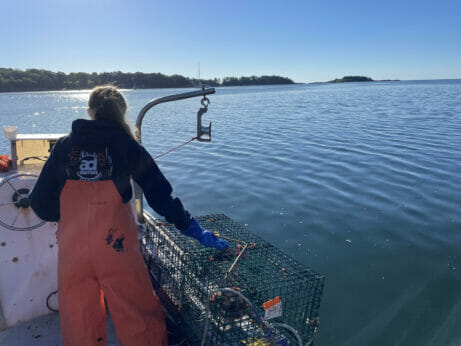
Marina Landrith’s family has been lobstering for five generations. (Photo courtesy Dale Landrith)
Thompson points out that in the lobstering world, family goes beyond flesh and blood. “Fishermen are some of the most generous people I’ve ever met,” she says. “They’ll stop what they’re doing and help you, tow you in, give you a part to fix your boat, so you can get back to haul. It’s a family within the lobstering industry.”
And the family of women who lobster continues to grow. In 2021, 15 percent of lobster licenses belonged to women, compared to less than 5 percent in 2014. When tomorrow’s generation of lobstermen look back at their family heritage, it won’t be a men’s club anymore.
“There’s different things that I might do that aren’t the way the men do it,” says Thompson. “But that doesn’t mean it’s wrong; it’s just different. Sometimes, you don’t have to do it the same as everybody else does. Do what’s best for you, what you are comfortable with and keep moving forward.”
STRONG, RESILIENT, INTELLIGENT MAINE WOMEN! Makes my 70 y.o. heart soar with pride!
Great story” Go ladies! In my own business I found the women were the best and most organized of all our employees.
Such a poised and meaningful article about brave women who love what they do. Thanks for getting this awesome story out. These women deserve a ton of credit.
I’m proud of these woman but not because they are woman who fish but because they are commercial fishermen. My own experience starting in the 70s to the present with woman fishermen is the overwhelming majority of fishermen and the community they fish out of are very supportive and proud of these woman because they are an example for all but particularly young girls who an become anything they put the effort into becoming. Linda Greenlaw is certainly the most famous female fishermen and has never seen herself as a fisherwoman, as she has said, the DON’T call female firemen… Read more »
Cool, my sister is law lobsters in the 80s
So 8-13 years old kids can do it, women can’t be too far behind. You know lobstering is tough, all those nice summer days on the water must get to you!
My best to these ladies.
Great story! But how did they mention Rockport and miss the 102 year old woman who still lobsters there and has most of her life?